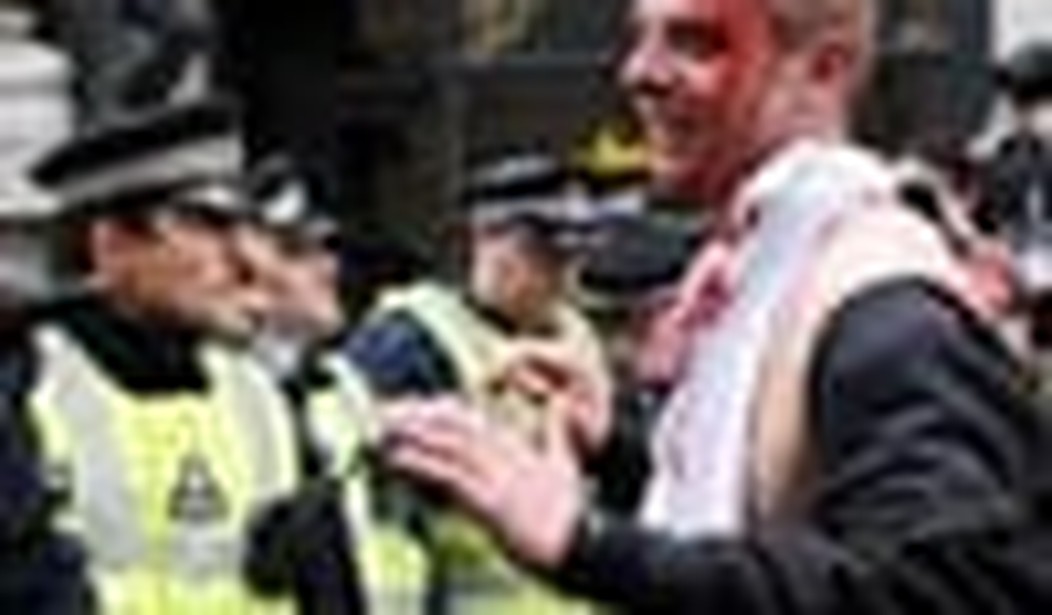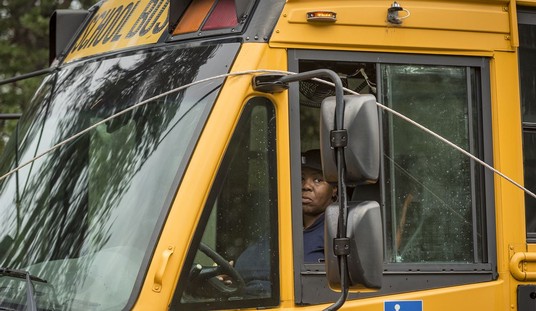Leaders from around the world have converged on London to have their photos taken with Barack Obama and, for a few hours between lunch and breakfast at tomorrow’s G20 meeting, will pay lip service to the task of tackling the global financial crisis.
Protesters equally cosmopolitan in origin and even more diverse in terms of their grievances have already turned up. At the protests, the Free Palestine crowd rubs shoulders with the anarchists, the British Muslim Initiative marches in lock-step with groups calling for the lynching of bankers, and global warming alarmists link arms with members of the Stop the War coalition.
President Obama won’t have seen such an ill-informed, self-righteous, and hysterical mob since his election night rally in Chicago. The headless chickens are coming home to roost.
But at least the protesters are, in some vague sense, united, which is more than can be said for the world leaders. France and Germany are leading opposition to calls by Obama and British PM Gordon Brown for increased public spending, and French President Nicolas Sarkozy has threatened to walk out of the summit if the U.S. and Britain don’t agree to his demands for tougher global financial regulations.
The summit will produce no “breakthroughs” or agreements of substance. It’s little more than a vanity project for Gordon Brown — one which is costing the British taxpayers somewhere in the region of £20 million pounds, with £7 million being spent on policing. But while precious little will be happening inside the ExCel Centre in London’s Docklands, outside the fortified “Green Zone” there will be two days of marches, sit-ins, and rallies galore. And just as at previous gatherings of world leaders from Seattle to Genoa, expect the violence, vandalism, and mayhem.
Much of the anger is directed at bankers — so much so that financial workers in London’s financial district are being advised to “dress down” and avoid unnecessary travel. But while bankers have certainly done plenty to make people angry of late, the ringleaders of the violence that will inevitably transpire don’t need an excuse to throw a brick through the window of Starbucks. This will be violence for the sake of violence, fueled by class-hatred, envy, alcohol, and drugs.
Leading the assault on the barricades and the police will be a hard-core hell-bent on violence and with little in the way of an ideology other than a desire to “smash the system,” while just behind the front lines will be the left-wing ideologues who are coordinating the “G20 Meltdown” protests. Their leaders include “academics” like Chris Knight, who has been suspended from the university where he teaches after suggesting that bankers should be hung from lampposts, and a former topless model turned white witch; their ideology is only slightly less incoherent than that of the anarchists.
The protests have already started, with gangs gathering outside banks to demand their “money back.” Given that many of those demonstrating are feckless dropouts who pay no taxes and have no savings or investments, it’s not clear exactly what money they want back or who has it. What they probably mean is “Give us lots of money for doing nothing,” but as slogans with which to start a revolution go, that one doesn’t really resonate.
Away from the violence, and wincing at the sound of each breaking window, will be a group best described as “the radical well-to-do” — comfortably off, well-educated, middle-class types. These people do at least have some savings to be concerned about, but they’re also stricken with guilt over their privileged lifestyles, and they’ve been whipped into a state of quivering indignation by vague concerns about “social justice,” “fairness,” and, of course, the ubiquitous fears over global warming.
This crowd spans the generations, from polite, elderly radicals trying to relive the glory days of the 1960s, to young, hopelessly spoiled, “trustafarians” (so named because they’re the offspring of well-off families whose “alternative” lifestyle is paid for by a trust fund), for whom there’s no greater thrill than being on the fringes of some authentically “edgy” social unrest. They might even throw the odd brick or two when they think no one is looking.
“Motley” doesn’t do this coalition justice. They are the violent, the thrill-seeking, the paranoid, the self-hating, the guilt-ridden, the naive, and the perpetually disappointed. And for the most part their causes are a similarly ragtag collection of alleged injustices, conspiracy theories, resentments, and hatreds. Still, this week at least, concerns about global warming and the war in Afghanistan are a sideshow to the main attraction: the demonization of the financial sector.
Peaceful protests over the financial crisis are perfectly justifiable, but such protests will be the exception rather than the rule. The more hardline elements who will be rampaging across London don’t need an excuse to cause trouble, and their ranks have been swelled, their anger fueled, and their actions given a veneer of respectability by the growing anger at financial institutions and their employees — anger which has been recklessly stoked by Obama, Brown, and their political allies.
The demonization process has followed a remarkably similar pattern in the U.S. and the UK, with politicians whipping up resentment against bankers in a bid to deflect attention from their own roles in bringing about the current crisis and from their ongoing incompetence and dishonesty. In America, Obama — who got elected in large part because of his ability to harness ignorance and a vague yearning for change — has led the Democrats’ efforts to turn the public against the financial sector, in particular against AIG and its bonus-collecting executives.
Intimidation and death threats ensued, and so effective have Obama’s tactics been that he’s thus far been able to ride out the revelations that his own Treasury secretary had known all along about AIG’s plans to pay the bonuses and that Senate Banking Committee chairman Chris Dodd had received tens of thousands of dollars in campaign donations from AIG executives. Meanwhile, as part of his broader strategy to foster an “us and them” mentality, Obama told Jay Leno that young people shouldn’t aspire to be investment bankers — this from a president whose chief of staff made $16 million doing that very job and who picked up $300,000 in loose change sitting on the board of Freddie Mac while it was embroiled in a massive accounting scandal. Here in the UK, for Obama and AIG read Gordon Brown and Sir Fred Goodwin, former chairman of collapsed bank RBS. There was widespread outrage when it emerged that Sir Fred was collecting a £700,000-a-year pension in spite of the failure of RBS; Brown demanded Sir Fred give back some of the money, but was embarrassed when it was revealed that his city minister, Lord Myners, had known of the pension arrangements. In a foretaste of the violence expected in London, vandals attacked Sir Fred’s home and car. It’s since emerged that Lord Myners, who has attacked bankers for their “greed,” made millions serving on the boards of hedge funds and other financial institutions before moving into politics.
And in a yest another scandal — one which is proving rather harder for the government to lay at the door of the financial sector — several of Brown’s senior Labor ministers have been accused of bending the rules on claiming expenses to a degree that would have Obama’s tax-cheating cabinet nominees shaking their heads in admiration.
Anger at those directly responsible for the current crisis is understandable, but those who protest against the excesses of the bankers might just as well rail against human nature. If a person is inclined towards greed, recklessness, and criminality then they will get away with whatever they’re allowed to get away with. It’s our politicians who are charged with ensuring that appropriate taxes are levied on high earners, than effective regulation is put in place, and that those who break the rules are caught and punished.
And that’s why Obama, Brown, and the rest are so keen that we continue to focus our anger on the bankers, while they attempt to clean up the mess they’ve made and cover their tracks. A few days ago Brown said he “understands” why people are demonstrating in the UK. Implicit in that remark is the suggestion that, while he might not condone such behavior, he also “understands” why some people might want to hurl rocks at policemen or set fire to the offices of financial companies.
Our politicians are desperately hoping that when we see footage of rioters smashing up central London we don’t make the connection between the violence and their own rhetoric and hypocrisy. But the truth is that the top bankers and the leading politicians are very often one and the same; they flit between the boardroom and the legislative chambers, enriching themselves in the private sector and looking after themselves and their friends from positions of political power.
While world leaders, as well as bankers, are being targeted by the protesters in London, the politicians have so far managed to channel much of the wider public resentment in the direction of the financial sector. Obama is doing a better job of this than Brown, who is on his way out whatever happens, but there are hints that buyer’s remorse is beginning to set in in Washington too.
For both leaders, a few broken windows and perhaps the odd cracked skull is a price well worth paying if they can keep the public from realizing who’s really responsible for the mess we’re in.









Join the conversation as a VIP Member